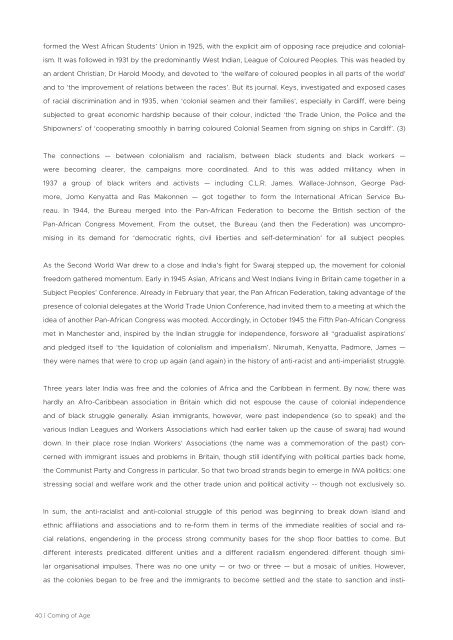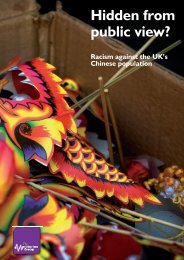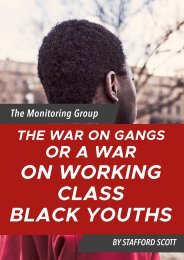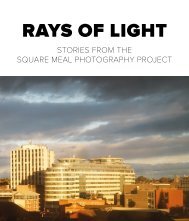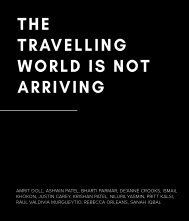Coming of Age : 1976 and the Road to Anti-Racism
Coming of Age : 1976 and the Road to Anti-Racism by Jagdish Patel and Suresh Grover
Coming of Age : 1976 and the Road to Anti-Racism
by Jagdish Patel and Suresh Grover
You also want an ePaper? Increase the reach of your titles
YUMPU automatically turns print PDFs into web optimized ePapers that Google loves.
formed <strong>the</strong> West African Students’ Union in 1925, with <strong>the</strong> explicit aim <strong>of</strong> opposing race prejudice <strong>and</strong> colonialism.<br />
It was followed in 1931 by <strong>the</strong> predominantly West Indian, League <strong>of</strong> Coloured Peoples. This was headed by<br />
an ardent Christian, Dr Harold Moody, <strong>and</strong> devoted <strong>to</strong> ‘<strong>the</strong> welfare <strong>of</strong> coloured peoples in all parts <strong>of</strong> <strong>the</strong> world’<br />
<strong>and</strong> <strong>to</strong> ‘<strong>the</strong> improvement <strong>of</strong> relations between <strong>the</strong> races’. But its journal. Keys, investigated <strong>and</strong> exposed cases<br />
<strong>of</strong> racial discrimination <strong>and</strong> in 1935, when ‘colonial seamen <strong>and</strong> <strong>the</strong>ir families’, especially in Cardiff, were being<br />
subjected <strong>to</strong> great economic hardship because <strong>of</strong> <strong>the</strong>ir colour, indicted ‘<strong>the</strong> Trade Union, <strong>the</strong> Police <strong>and</strong> <strong>the</strong><br />
Shipowners’ <strong>of</strong> ‘cooperating smoothly in barring coloured Colonial Seamen from signing on ships in Cardiff’. (3)<br />
The connections — between colonialism <strong>and</strong> racialism, between black students <strong>and</strong> black workers —<br />
were becoming clearer, <strong>the</strong> campaigns more coordinated. And <strong>to</strong> this was added militancy when in<br />
1937 a group <strong>of</strong> black writers <strong>and</strong> activists — including C.L.R. James. Wallace-Johnson, George Padmore,<br />
Jomo Kenyatta <strong>and</strong> Ras Makonnen — got <strong>to</strong>ge<strong>the</strong>r <strong>to</strong> form <strong>the</strong> International African Service Bureau.<br />
In 1944, <strong>the</strong> Bureau merged in<strong>to</strong> <strong>the</strong> Pan-African Federation <strong>to</strong> become <strong>the</strong> British section <strong>of</strong> <strong>the</strong><br />
Pan-African Congress Movement. From <strong>the</strong> outset, <strong>the</strong> Bureau (<strong>and</strong> <strong>the</strong>n <strong>the</strong> Federation) was uncompromising<br />
in its dem<strong>and</strong> for ‘democratic rights, civil liberties <strong>and</strong> self-determination’ for all subject peoples.<br />
As <strong>the</strong> Second World War drew <strong>to</strong> a close <strong>and</strong> India’s fight for Swaraj stepped up, <strong>the</strong> movement for colonial<br />
freedom ga<strong>the</strong>red momentum. Early in 1945 Asian, Africans <strong>and</strong> West Indians living in Britain came <strong>to</strong>ge<strong>the</strong>r in a<br />
Subject Peoples’ Conference. Already in February that year, <strong>the</strong> Pan African Federation, taking advantage <strong>of</strong> <strong>the</strong><br />
presence <strong>of</strong> colonial delegates at <strong>the</strong> World Trade Union Conference, had invited <strong>the</strong>m <strong>to</strong> a meeting at which <strong>the</strong><br />
idea <strong>of</strong> ano<strong>the</strong>r Pan-African Congress was mooted. Accordingly, in Oc<strong>to</strong>ber 1945 <strong>the</strong> Fifth Pan-African Congress<br />
met in Manchester <strong>and</strong>, inspired by <strong>the</strong> Indian struggle for independence, forswore all “gradualist aspirations’<br />
<strong>and</strong> pledged itself <strong>to</strong> ‘<strong>the</strong> liquidation <strong>of</strong> colonialism <strong>and</strong> imperialism’. Nkrumah, Kenyatta, Padmore, James —<br />
<strong>the</strong>y were names that were <strong>to</strong> crop up again (<strong>and</strong> again) in <strong>the</strong> his<strong>to</strong>ry <strong>of</strong> anti-racist <strong>and</strong> anti-imperialist struggle.<br />
Three years later India was free <strong>and</strong> <strong>the</strong> colonies <strong>of</strong> Africa <strong>and</strong> <strong>the</strong> Caribbean in ferment. By now, <strong>the</strong>re was<br />
hardly an Afro-Caribbean association in Britain which did not espouse <strong>the</strong> cause <strong>of</strong> colonial independence<br />
<strong>and</strong> <strong>of</strong> black struggle generally. Asian immigrants, however, were past independence (so <strong>to</strong> speak) <strong>and</strong> <strong>the</strong><br />
various Indian Leagues <strong>and</strong> Workers Associations which had earlier taken up <strong>the</strong> cause <strong>of</strong> swaraj had wound<br />
down. In <strong>the</strong>ir place rose Indian Workers’ Associations (<strong>the</strong> name was a commemoration <strong>of</strong> <strong>the</strong> past) concerned<br />
with immigrant issues <strong>and</strong> problems in Britain, though still identifying with political parties back home,<br />
<strong>the</strong> Communist Party <strong>and</strong> Congress in particular. So that two broad str<strong>and</strong>s begin <strong>to</strong> emerge in IWA politics: one<br />
stressing social <strong>and</strong> welfare work <strong>and</strong> <strong>the</strong> o<strong>the</strong>r trade union <strong>and</strong> political activity -- though not exclusively so.<br />
In sum, <strong>the</strong> anti-racialist <strong>and</strong> anti-colonial struggle <strong>of</strong> this period was beginning <strong>to</strong> break down isl<strong>and</strong> <strong>and</strong><br />
ethnic affiliations <strong>and</strong> associations <strong>and</strong> <strong>to</strong> re-form <strong>the</strong>m in terms <strong>of</strong> <strong>the</strong> immediate realities <strong>of</strong> social <strong>and</strong> racial<br />
relations, engendering in <strong>the</strong> process strong community bases for <strong>the</strong> shop floor battles <strong>to</strong> come. But<br />
different interests predicated different unities <strong>and</strong> a different racialism engendered different though similar<br />
organisational impulses. There was no one unity — or two or three — but a mosaic <strong>of</strong> unities. However,<br />
as <strong>the</strong> colonies began <strong>to</strong> be free <strong>and</strong> <strong>the</strong> immigrants <strong>to</strong> become settled <strong>and</strong> <strong>the</strong> state <strong>to</strong> sanction <strong>and</strong> insti-<br />
40 | <strong>Coming</strong> <strong>of</strong> <strong>Age</strong><br />
<strong>Coming</strong> <strong>of</strong> <strong>Age</strong> Final version 16.10.indd 40 17/10/2017 12:07


